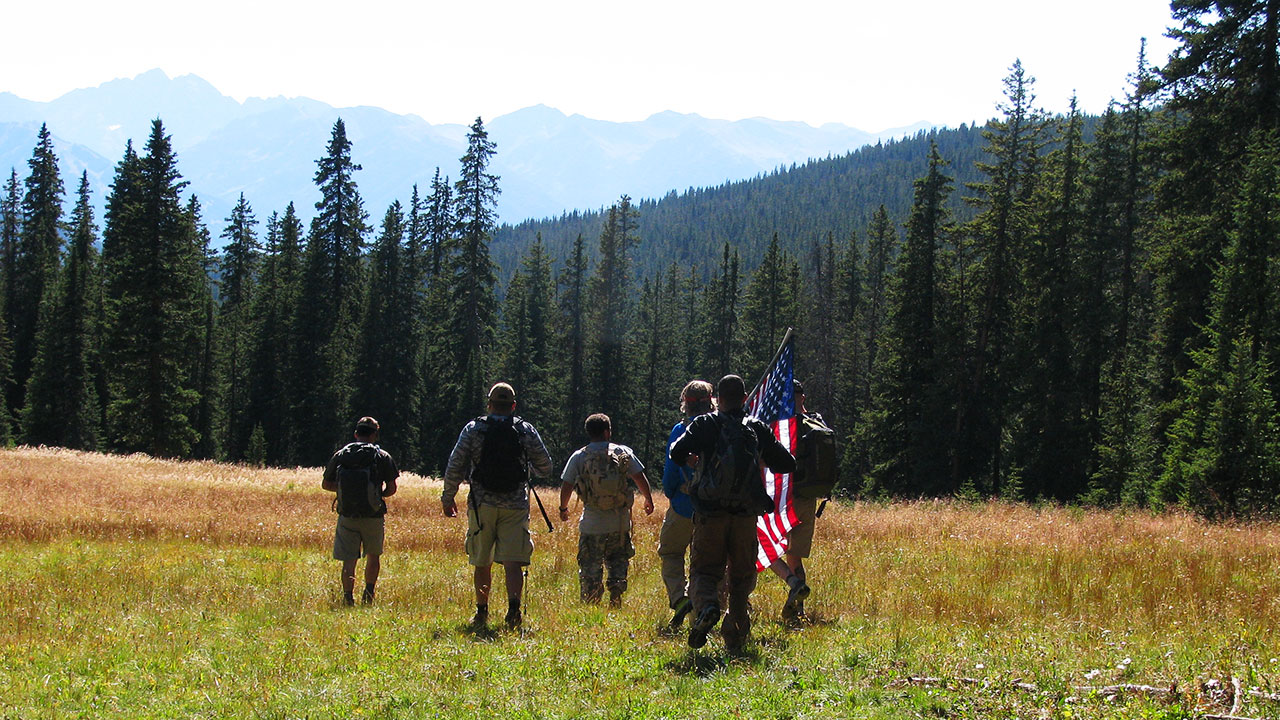“A wilderness area may well have more psychological importance than hundreds of beds in a mental hospital.” – Rod Nash
Wilderness therapy programs are springing up around the US as alternatives to institutional treatment settings. Researchers have discovered that therapeutic relationships are often forged more quickly in wilderness because of the forced intimacy of a small group walking within the immensity of a National Forest. This enables ideas and experiences to be more easily and openly shared, setting the stage for meaningful interpersonal communication.
With three full days in the mountains the effects of wilderness are, on their own, therapeutic. The static of the outside world becomes muted and the senses grow more acute. A calming remove from the tumult of the world is quickly achieved as there is no cell or internet reception. Focus on the ideas explored in the seminar becomes more pronounced while immersion in nature is unfiltered.
Individual engagement at many psychological and experiential levels is at the core of the Huts For Vets philosophy. By providing total immersion in wild nature along with intellectual exploration, contemplative thought, and communal interactions, the stage is set for reflection, introspection and transcendence.
Philosopher Laurens Van Der Post, in his essay, “Wilderness – A Way of Truth,” described this unique approach: “We have got to remember the needs and hunger of our instinctive, intuitive, natural self. In the modern world, we have become so engaged in doing that we have become divorced from the aspect of our selves, which gives us being.”
Optional wilderness “solos” awaken participants to “being” by providing a period of solitary, reflective time, without distraction. For most, this invites an all-too-rare exposure to their deepest thoughts and most pressing emotions. What bubbles to the surface are the topics most important to address, either individually or with the group.
An experiential awareness of nature while hiking serves to activate and engage the whole person – body/mind/spirit – which opens participants to the world around them and the world inside them. The very act of breathing while hiking in the mountains provides a rhythmic and meditative pulse that can soothe the soul.
“Above all,” urged the philosopher Soren Kierkegaard, “do not lose your desire to walk. Every day I walk myself into a state of well being, and walk away from every illness. I have walked myself into my best thoughts, and I know of no thought so burdensome that one cannot walk away from it.”
Kierkegaard was not suggesting avoidance, but rather engagement. The walking pace helps the unconscious mind churn through problems, challenges and relationships. When walking in the sublime beauty and expansiveness of wilderness, a transcendent opening may occur that can shift the mind and promote realizations hitherto unknown.
Wilderness historian Rod Nash suggests: “Wilderness offers a unique opportunity for psychological renewal – literally re-creation. The reason is that our minds developed under wilderness conditions for millions of years. Suddenly, in the last few hundred years, we have been propelled into a world of manmade speed and complexity. For some people occasional relief is a vital mental necessity.”
One wilderness therapy study observed: “It is hard to explain why people feel an uncanny sense of ease in sharing stories, problems, or mysteries around a campfire. Or why, on a particularly rainy morning a wildflower or the sound of a mourning dove could bring a participant to tears, or why a stray comment made on the side of a mountain can change a life.”
Nature’s humbling and insightful forces often have a cumulative effect as participants connect to the beauty around them. This sublime esthetic union penetrates deep into the conscious and unconscious to touch the body, stimulate the mind and enliven the soul.
“The benefits of walking in nature include giving the brain a respite from the multi-tasking of everyday life,” wrote John Schwartzberg, M.D. in the Berkeley Wellness Letter. “Time slows down and makes thinking clearer. Walking through forests helps reduce stress, lower blood pressure and heart rate, and help the immune system.”
Unlike “adventure-based” therapy, where risks and daunting challenges create a level of fear, Huts For Vets is a hybrid of non-threatening physical and intellectual discovery. The hiking is demanding, but not overly strenuous. While there are stream crossings over logs, and the trail is rough with rocks and roots, risks are minimal. There is no agenda to frighten or intimidate. The readings that form the curriculum are selected to draw out ideas through discussions that can expand awareness and connectivity.
Huts For Vets is not about survival, but rather about thriving with a healthy psychology, a vitalized body, and a receptive spirit. Physical demands are met while esthetic and intellectual benefits are maximized. The outcome is an elated spirit that enlivens participants, whether by reaching a mountaintop or penetrating the innermost world of ideas.
A trained psychologist is available to the group if an intervention is necessary and staff is trained in wilderness First Aid. Formal counseling, however, is not part of the program. All insights come from discussions, hiking, solos, and during communal activities at the hut – cooking healthy meals, washing dishes, hauling water, or simply watching the swirl of clouds or the setting sun paint the sky in pastel hues.
Huts for Vets is designed to promote an enlarged sense of self through an intensified belonging to the natural world. This larger belonging can provide security, identity and psychological strength, all derived from the realization that we are part of something bigger, older and more complex than anything we know. There is nothing like a starry night sky to enhance this awareness.
With three days in the wilderness, participants are offered a calming environment, a healing tonic, new friendships, and personal growth opportunities. Ideally, participants will leave this program feeling better equipped to begin their own journeys of body and mind, with the lifelong goal of renewing spiritual health. The ultimate takeaway is a positive, fulfilling, holistic transformation that can last a lifetime.

